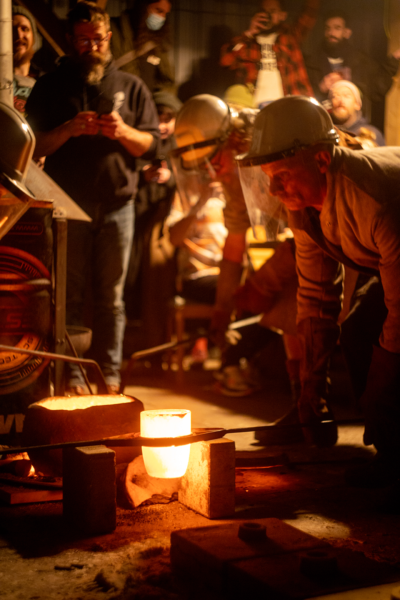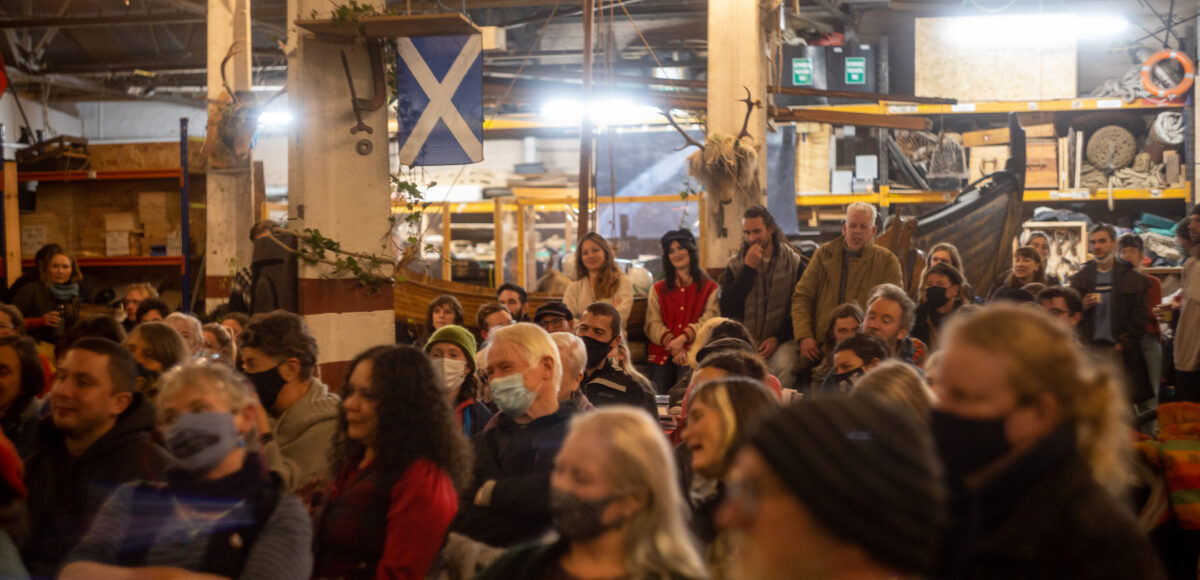‘I, Ana Laide Soares Barbosa, great granddaughter of the enslaved, Granddaughter of peasants and fishing people, fisherwoman, accept the invitation to this new world of Govan, and declare myself welcome.’
Cultivating resistance and hope between Amazônia and Caledonia, Govan Free State, 3 November 2021
‘Yesterday the Caledonian forests fell to the speculators from the south, today from Amazonia to the Siberian forests, the seemingly unstoppable encroachment of market forces continues to wreak environmental havoc … the market logic now threatens the possible elimination of the fundamental biological diversity on which life itself depends.’
Colin Macleod, ‘Land and Liberty’ (1993)
If Glasgow’s fate is bound up with the Clyde, the extent to which the present day city has turned its back on the river doesn’t bode well. What was once a highway of constant noise and traffic is now a largely mute barrier.
But the Clyde’s global pre-eminence has been briefly restored by the glut of leaders and diplomats gathered in the enclave of the COP26 Blue Zone: with the patrol craft of the Ministry of Defence Police providing an unusual amount of activity on the water.
With an eye on such strangeness, a rival territory claiming its own mandate has appeared just across the river from the temporary expanse of this net-zero trade fair.
Govan Free State is part provocation, part tribute to its predecessor in Pollok, part invitation to the world-in-miniature that has parked up on its doorstep.
But there is also a solemnity to this declaration of autonomy, rooted in the name and the place: a place that is as bound to the banks of the Clyde as the Conference of the Parties is ephemeral.
Ancient things abound in the parish of Govan; the old and strange but also the live and familiar. Having spent most of COP26 based at Govan Free State, with its ‘territories’ at GalGael and the Pearce Institute; I can attest that time does seem mixed up here.
From one glance to another, there flashes a response to COP26, then some ancient ritual from a distant forest, or some voices above the noise of a workshop. This is, after all, the free state of Govan, Baile a’ Ghobhainn, ‘the smith’s town,’ bound up with the things that it makes.
Govan means a great deal in Scottish history. From the Kingdom of Strathcylde, to the rent-strikes, UCS and the Govan by-election: it is a place where people have asserted their autonomy and power in cruel and uncertain times. As a result Govan has a significance that many would not infer from its wounded face.

But perhaps now is the time of the wounded. It is their cry that is heard throughout the terms of this new entity. As Govan Free State’s Declaration asserts:
‘Centuries of colonialism, imperialism and capitalism have impoverished most of the world, destroyed cultures and ways of being and knowing which have been millennia in the making, devastated ecosystems and biospheres, and led to the genocide of so many human and more-than human beings that our hearts simply cannot fathom the scale of the loss and the pain. Every single life lost so far in the name of profit and imperial expansion is a crime.’
It has been too often overlooked by much of the coverage of COP26, but the presence of many indigenous people who have brought their grief and trauma from the frontlines has been of profound significance.
Govan Free State attempts to hold that grief and to engage in a dialogue with the distinct forms of exploitation visited upon the people of Govan, historically and through to the present day.
Calls to ‘decolonise’ might seem jarring here, where the engines of empire are rusted and dilapidated, but a space to consider what that big word might mean has opened up.
The Irish singer Frank Harte memorably said that ‘those in power write the laws and those who suffer write the songs,’ but Govan Free State upends that truism and with it all the empty theatre of COP26.
In these times, those who suffer will write the laws, sooner or later. For the years ahead we will need to learn to share loss more freely. We will have to look at the wounded faces around us and from afar, we will have to re-learn how to live together when consumerism collapses and exposes the pain of individualism that it claimed to soothe.
The outmoded nature of what has taken place in Glasgow over the past week is understood to be as absurd as any ancien regime unable to confront the rising tide of its own contradictions. Global systems have collapsed before.
As the current global system dies, it is inflicting pain on a scale that defies understanding. That system cannot change: the evidence is clear, it is not ‘building back better’ but simply reinstating all the most dangerous, destructive and demeaning aspects of the economy that were suspended in 2020.
To look to a new structure and a new world is the only rational option left. Govan Free State’s declaration of radical local democracy, solidarity, and kinship should be understood as just one place to stand within an ongoing war of position with an undead economic system.
Perhaps all this talk of freedom and decolonising is just the radical mirror image of the ‘blah blah blah’ of COP officialdom. Glasgow is currently awash with declarations and statements of intent that aren’t likely to be followed by substantive action.
But this is to forget the absurdity of the state we all find ourselves in. A state described by one Fridays for Future campaigner in BBC Scotland’s documentary Black Black Oil as ‘being constantly worried about whether or not you’re going to have a future.’
We know that those futures are in the process of being sacrificed for profit.
In the global north, actions in which people assert autonomy have only happened sporadically in response to climate breakdown. It is this, at root, which allows our leaders to defer meaningful action.
In many parts of the global south taking a stand is a necessity, not a choice. This is why Govan Free State, in staking out its own territory, embraces the words of Ana Laide Soares Barbosa, whose Amazônian people face twin existential threats from the Belo Monte dam and the proposed construction of the largest open cast gold mine in Brazil.
But while those societies are now suffering encroachment and displacement far more than in the rich north, they could turn out to be more resilient in the face of large-scale disruption.
As Amitav Ghosh outlines, societies in the global south tend to retain stronger community networks, with religious worldviews still widespread. The latter, argues Ghosh: ‘transcend the nation-state, and […] acknowledge intergenerational, long-term responsibilities.’
‘It is impossible to see any way out of this crisis without an acceptance of limits and limitations, and this in turn is, I think, intimately related to the idea of the sacred, however one may wish to conceive of it,’ he concludes.
Govan Free State seeks out the sacred in the immediate bonds of community, deeper patterns of culture and the wonders of ecology: as the only stable basis for the preservation and restoration of life and freedom in the decades to come.
During the unemployment crisis of 1907-08 the Times reported that 16,000 people in Govan were ‘on the verge of starvation,’ a reminder that hunger and poverty were hallmarks of the heyday of empire too. In response, the shipyard joiners brought out a banner from the previous century which read:
‘They are unworthy of freedom, who hope for it from hands other than their own.’
This new world of Govan has old, deep, roots.
Photos by Oran Macleod @oranm
